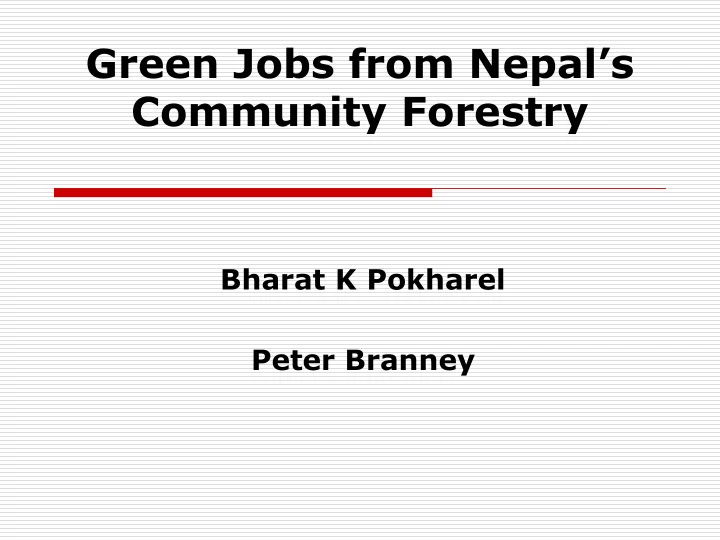

Green Jobs from Nepal’s Community Forestry Bharat K Pokharel Peter Branney
The main focus The concept of green jobs in the context of community forestry The context of community forestry and potential of green jobs in Nepal Community forestry: Reservoir of green jobs and community forestry Opportunities and challenges for green jobs
Forest conservation Jiri, Dolakha 1968 Jiri, Dolakha 2008
Green jobs Bio-Briquette Timber Resin Essential Oil
Nepali handmade paper
Bel juice
An example: Forest based enterprises (n=178) Product CFUGs (in no.) Resin 36 Timber 35 Essential oil 25 Handmade paper 21 Bel juice 12 Bio briquette 12 Amala candy 7 Leaf plate 3 Musical instrument 1 Bamboo basket and furniture 2 Wooden mask 1 Allo processing 1 Total 121
Relevance of the concept of green jobs in community forestry Jobs that reduce the negative environmental impact meet the standards of ‘decent work’ contribute to a low-carbon development reduce consumption of energy and raw materials; limit green house gas emission minimize waste and pollution and protect and restore ecosystems The good governance through green jobs – socially inclusive, targeting women, young and people living in poverty Contribution of green jobs – MDG One ( poverty reduction) and MDG Seven ( protecting the environment ) mutually supportive. Any project should have a low carbon emission technology and practice Environmentally friendly and climate resilient economy
The context of community forestry and potential of green jobs in Nepal 15,000 Community Forest User Groups (CFUGs) 38% of Nepal’s population (1.6 m families) From running cost of community forestry 30,000 jobs round the year; From benefits - goods and services 300,000 jobs every year.
Community forestry: alternative way of creating (green) jobs Community Forest User Groups create jobs through Forestry , agriculture and energy Community infrastructure development Human and social development Some examples – Photos and figures
Contribution of Community Forestry in Creating jobs to reduce poverty and to limit green house gas emission
Communities have transferred 1. barren land into dense forest Increase Farmers have grown wood and forest land food together Communities bear the cost
Forests in Dadapakhar Nepal in 1978 Now
2. Increase forest Community forest density density has increased and biomass
Forest in Mude Nepal after 27 years 1978 NOW
3. Reduce the rate of Communities have been able to deforestation reduce the rate of deforestation and and degradation degradation
Charikot , Nepal in 1986 and Now
Local communities and farmers 4. organised in community groups Conservation have practiced agro-forestry, of forests afforested degraded land, conserved forests, biodiversity and watersheds in a much effective way
Gully in Bonch, Nepal after 30 years 1978 NOW
Suspa, Dolakha 1986 NOW
Benefit to people living in poverty Grant (Rs. '000) Soft loan (Rs.'000) Timber (cu.ft.) Grant (Rs. '000) Soft loan (Rs.'000) Timber (cu.ft.) 149 506 6096 174 3233 17 2006 2008 2006 2008 2006 2008 Area of land Scholarship (Ha.) Land (HHs) (no.) Area of land (Ha.) Land (HHs) Scholarship (no.) 401 154 369 14 185 181 2006 2008 2006 2008 2006 2008 Employment (person Enterprise (share year) holder) Employment (person year) Enterprise (share holder) 209 174 601 601 2006 2008 2006 2008
Learning Recognise the contribution of CF in protecting environment and • CREATING GREEN JOBS IN reducing poverty Craft clear policy and legal framework, simple procedures and • local level institutional mechanisms to reach the poorest households Value multiple functions of forests for both climate change • adaptation and mitigation that should contribute to green jobs Do not divert attention from poverty agenda, instead promote • pro-poor governance as the pre-requisite to fight against poverty and climate change
Opportunities and challenges for green jobs Opportunities The World Bank (1989) estimation - NRs 22500 million (22 Arab 50 crore) income annually from sustainable wood harvesting alone (Sowerwine, 1994). Same amount from non-wood products, e.g. herbs, essential oils, resins, fibers etc. Challenges At the moment forestry sector generate only 5% revenue of its potential Firstly, policy, regularity and institutional constraint Secondly, inappropriate forest land tenure system for value chain Finally, forestry sector lacks business services to promote entrepreneurship, enterprises and income earning activities
1 Enabling Environment for enterprise and business 2 Actors in market (value) chain Processing enterprise Traders Exporters Collectors Contractors 3 Business service providers
Challenges cont…. REDD+ in red and s econd (+) in green R= Reducing R = Rights over forest resources E = Emission E = Equitable benefit sharing D = D = Devolution of power to Deforestation communities D = Degradation D = Democracy at the grass root + = Conserve + = Development of forestry forests sector – wood and food together
Who invest? And who benefit? Forestry Security Institu. Ecological Contri. to Prospect Prospect of Regime of performance performance poverty of benefit tenure reduction benefit from CC Right from adaptation REDD+ Government High Low Low Low High Medium Private High Medium Medium High Medium High Community Low High High High Low High forestry Leasehold LOW High High High Low High forestry Source: Karky and Banskota, 2009; Mahat, 2010 modified
CHALLENGES OF UNDER UTILISATION Scenario in Dolakha in 2009 (N=245) 2319587 2500000 2000000 1500000 1000000 669828 671445 500000 131616 1663 0 Damand Annual Prescribed Actual Supply to increment @ volume harvest poor 1.3%
Conclusions Community forestry has huge potential for green jobs Creates ‘decent work’ in rural areas Contribute to a low-carbon development Sequestrates carbon rerduces emission; Restore ecosystems and increases community's capacities for adaptation Promotes socially inclusive governance and improve livelihoods of people living in poverty. Climate resilient economy Contributes positively to MDG 1 and 7 directly But communities are less likely to benefit unless climate change intervention is made community centric
Recommend
More recommend